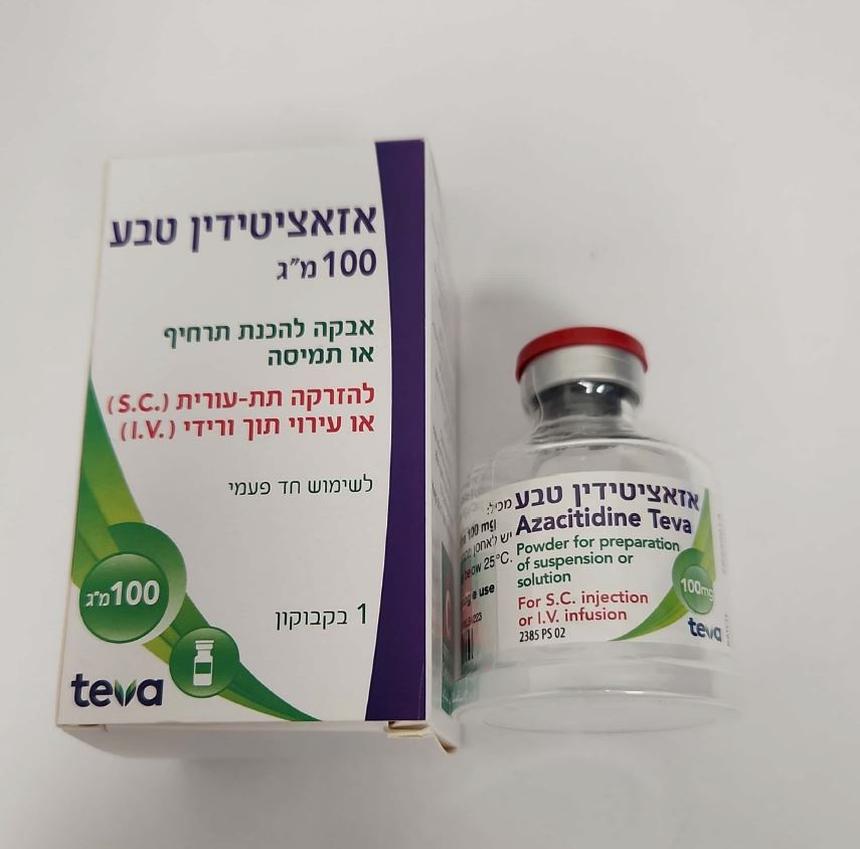Quest for the right Drug

אזאציטידין טבע AZACITIDINE TEVA (AZACITIDINE)
תרופה במרשם
תרופה בסל
נרקוטיקה
ציטוטוקסיקה
צורת מתן:
תת-עורי, תוך-ורידי : S.C, I.V
צורת מינון:
אין פרטים : LYOPHILIZED POWDER FOR SUSPENSION FOR SC INJECTION / SOLUTION FOR INFUSION
עלון לרופא
מינוניםPosology התוויות
Indications תופעות לוואי
Adverse reactions התוויות נגד
Contraindications אינטראקציות
Interactions מינון יתר
Overdose הריון/הנקה
Pregnancy & Lactation אוכלוסיות מיוחדות
Special populations תכונות פרמקולוגיות
Pharmacological properties מידע רוקחי
Pharmaceutical particulars אזהרת שימוש
Special Warning עלון לרופא
Physicians Leaflet
Posology : מינונים
3 DOSAGE AND ADMINISTRATION 3.1 Important Administration Information Do not substitute Azacitidine Teva for oral azacitidine. The indications and dosing regimen for Azacitidine Teva differ from that of oral azacitidine [see Warnings and Precautions (5.1)] 3.2 First Treatment Cycle The recommended starting dose for the first treatment cycle, for all patients regardless of baseline hematology laboratory values, is 75 mg/m2 subcutaneously or intravenously, daily for 7 days. Premedicate patients for nausea and vomiting. Obtain complete blood counts, liver chemistries and serum creatinine prior to the first dose. 3.3 Subsequent Treatment Cycles Repeat cycles every 4 weeks. The dose may be increased to 100 mg/m2 if no beneficial effect is seen after 2 treatment cycles and if no toxicity other than nausea and vomiting has occurred. It is recommended that patients be treated for a minimum of 4 to 6 cycles. However, complete or partial response may require additional treatment cycles. Treatment may be continued as long as the patient continues to benefit. Monitor patients for hematologic response and renal toxicities [see Warnings and Precautions (5.4)], and delay or reduce dosage if necessary [see Dosage and Administration (3.5)]. 3.4 Dosage Adjustment Based on Hematology Laboratory Values o For patients with baseline (start of treatment) WBC greater than or equal to 3 x109/L, ANC greater than or equal to 1.5 x109/L, and platelets greater than or equal to 75 x109/L, adjust the dose as follows, based on nadir counts for any given cycle: Nadir Counts % Dose in the Next Course 9 9 ANC (x10 /L) Platelets (x10 /L) Less than 0.5 Less than 25 50% 0.5 -1.5 25-50 67% Greater than 1.5 Greater than 50 100% o For patients whose baseline counts are WBC less than 3 x109/L, ANC less than 1.5 x109/L, or platelets less than 75 x109/L, base dose adjustments on nadir counts and bone marrow biopsy cellularity at the time of the nadir as noted below, unless there is clear improvement in differentiation (percentage of mature granulocytes is higher and ANC is higher than at onset of that course) at the time of the next cycle, in which case continue the current dose. Bone Marrow WBC or Platelet Nadir Biopsy Cellularity at Time of Nadir (%) % decrease in counts 30-60 15-30 Less than 15 from baseline % Dose in the Next Course 50 - 75 100 50 33 Greater than 75 75 50 33 If a nadir as defined in the table above has occurred, give the next course 28 days after the start of the preceding course, provided that both the WBC and the platelet counts are greater than 25% above the nadir and rising. If a greater than 25% increase above the nadir is not seen by day 28, reassess counts every 7 days. If a 25% increase is not seen by day 42, reduce the scheduled dose by 50%. 3.5 Dosage Adjustment Based on Serum Electrolytes and Renal Toxicity If unexplained reductions in serum bicarbonate levels to less than 20 mEq/L occur, reduce the dosage by 50% for the next course. Similarly, if unexplained elevations of BUN or serum creatinine occur, delay the next cycle until values return to normal or baseline and reduce the dose by 50% for the next course [see Warnings and Precautions (5.4)]. 3.6 Use in Geriatric Patients Azacitidine and its metabolites are known to be substantially excreted by the kidney, and the risk of toxic reactions to this drug may be greater in patients with impaired renal function. Because elderly patients are more likely to have decreased renal function, select the dose carefully and monitor renal function [see Warnings and Precautions (5.4) and Use in Specific Populations (7.5)]. 3.7 Preparation of Azacitidine Teva Azacitidine Teva is a hazardous drug. Follow applicable special handling and disposal procedures. The Azacitidine Teva vial is single-dose and does not contain any preservatives. Discard unused portions of each vial properly [see How Supplied/Storage and Handling (13)]. Do not save any unused portions for later administration. 3.8 Instructions for Subcutaneous Administration Reconstitute Azacitidine Teva aseptically with 4 mL sterile water for injection, to obtain a concentration of 25 mg/mL. Inject the diluent slowly into the vial. Vigorously shake or roll the vial until a uniform suspension is achieved. The suspension will be cloudy. Do not filter the suspension after reconstitution. Doing so could remove the active substance. Preparation for Immediate Subcutaneous Administration: For doses requiring more than 1 vial, divide the dose equally between the syringes (e.g., dose 150 mg = 6 mL, 2 syringes with 3 mL in each syringe) and inject into two separate sites. Due to retention in the vial and needle, it may not be feasible to withdraw all of the suspension from the vial. The product may be held at room temperature for up to 1 hour, but must be administered within 1 hour after reconstitution. Preparation for Delayed Subcutaneous Administration: The reconstituted product may be kept in the vial or drawn into a syringe. For doses requiring more than 1 vial, divide the dose equally between the syringes (e.g., dose 150 mg = 6 mL, 2 syringes with 3 mL in each syringe) and inject into two separate sites. Due to retention in the vial and needle, it may not be feasible to withdraw all of the suspension from the vial. The product must be refrigerated immediately. See Table 7 for suspension stability storage timelines based on the temperature of the diluent for delayed subcutaneous administration After removal from refrigerated conditions, the suspension may be allowed to equilibrate to room temperature for up to 30 minutes prior to administration. Subcutaneous Administration To provide a homogeneous suspension, the contents of the dosing syringe must be re- suspended immediately prior to administration. To re-suspend, vigorously roll the syringe between the palms until a uniform, cloudy suspension is achieved. Azacitidine Teva suspension is administered subcutaneously. Rotate sites for each injection (thigh, abdomen, or upper arm). New injections should be given at least one inch from an old site and never into areas where the site is tender, bruised, red, or hard. Suspension Stability: Please refer to section 13 - How Supplied/Storage and Handling: Storage. 3.9 Instructions for Intravenous Administration Parenteral drug product should be inspected visually for particulate matter and discoloration prior to administration, whenever solution and container permit. Do not use the product if there is evidence of particulate matter or discoloration. Reconstitute the appropriate number of Azacitidine Teva vials to achieve the desired dose. Reconstitute each vial with 10 mL Sterile Water for Injection. Vigorously shake or roll the vial until all solids are dissolved. The resulting solution will contain azacitidine 10 mg/mL. The solution should be clear. Withdraw the required amount of Azacitidine Teva solution to deliver the desired dose and inject into a 50 -100 mL infusion bag of either 0.9% Sodium Chloride Injection or Lactated Ringer's Injection. Intravenous Solution Incompatibility Azacitidine is incompatible with 5% Dextrose Injection solutions, Hespan, or solutions that contain bicarbonate. These solutions have the potential to increase the rate of degradation of Azacitidine and should therefore be avoided. Intravenous Administration Azacitidine Teva solution is administered intravenously. Administer the total dose over a period of 10 - 40 minutes. The administration must be completed within 1 hour of reconstitution of the Azacitidine Teva vial. Solution Stability: Azacitidine Teva reconstituted and diluted for intravenous administration may be stored at 25°C, but administration must be completed within 1 hour of reconstitution. Please refer to section 13 - How Supplied/Storage and Handling: Storage.

פרטי מסגרת הכללה בסל
א. התרופה תינתן לטיפול במקרים האלה:1. תסמונות מיאלודיספלסטיות בהתקיים אחד אלה: א. MDS (תסמונת מיאלודיספלסטית) המסווגת כ-Int 2/high לפי IPSS; ב. MDS בה מתקיימים לפחות שניים משלושת התנאים הבאים: 1. תלות בעירויי דם; 2. טסיות ברמה של 50,000 או פחות; 3. גרנולוציטים ברמה של 1,000 או פחות. ג. חולים סימפטומטיים הסובלים מדימומים או זיהומים חוזרים. 2. בשילוב עם Venetoclax, לטיפול בלוקמיה מסוג AML בחולה שטרם קיבל טיפול סיסטמי למחלתו ואיננו מתאים לטיפול בכימותרפיה אינטנסיבית. ב. לא יינתנו התרופות Decitabine, Azacitidine בו בזמן.ג. מתן התרופה האמורה ייעשה לפי מרשם של מומחה באונקולוגיה או רופא מומחה בהמטולוגיה.
מסגרת הכללה בסל
התוויות הכלולות במסגרת הסל
| התוויה | תאריך הכללה | תחום קליני | Class Effect | מצב מחלה |
|---|---|---|---|---|
| בשילוב עם Venetoclax, לטיפול בלוקמיה מסוג AML בחולה שטרם קיבל טיפול סיסטמי למחלתו ואיננו מתאים לטיפול בכימותרפיה אינטנסיבית | 16/01/2019 | המטולוגיה | לוקמיה מסוג AML | |
| תסמונות מיאלודיספלסטיות | 01/03/2008 | המטולוגיה | DECITABINE, AZACITIDINE | תסמונות מיאלודיספלסטיות |
שימוש לפי פנקס קופ''ח כללית 1994
לא צוין
תאריך הכללה מקורי בסל
01/03/2008
הגבלות
תרופה מוגבלת לרישום ע'י רופא מומחה או הגבלה אחרת
מידע נוסף
